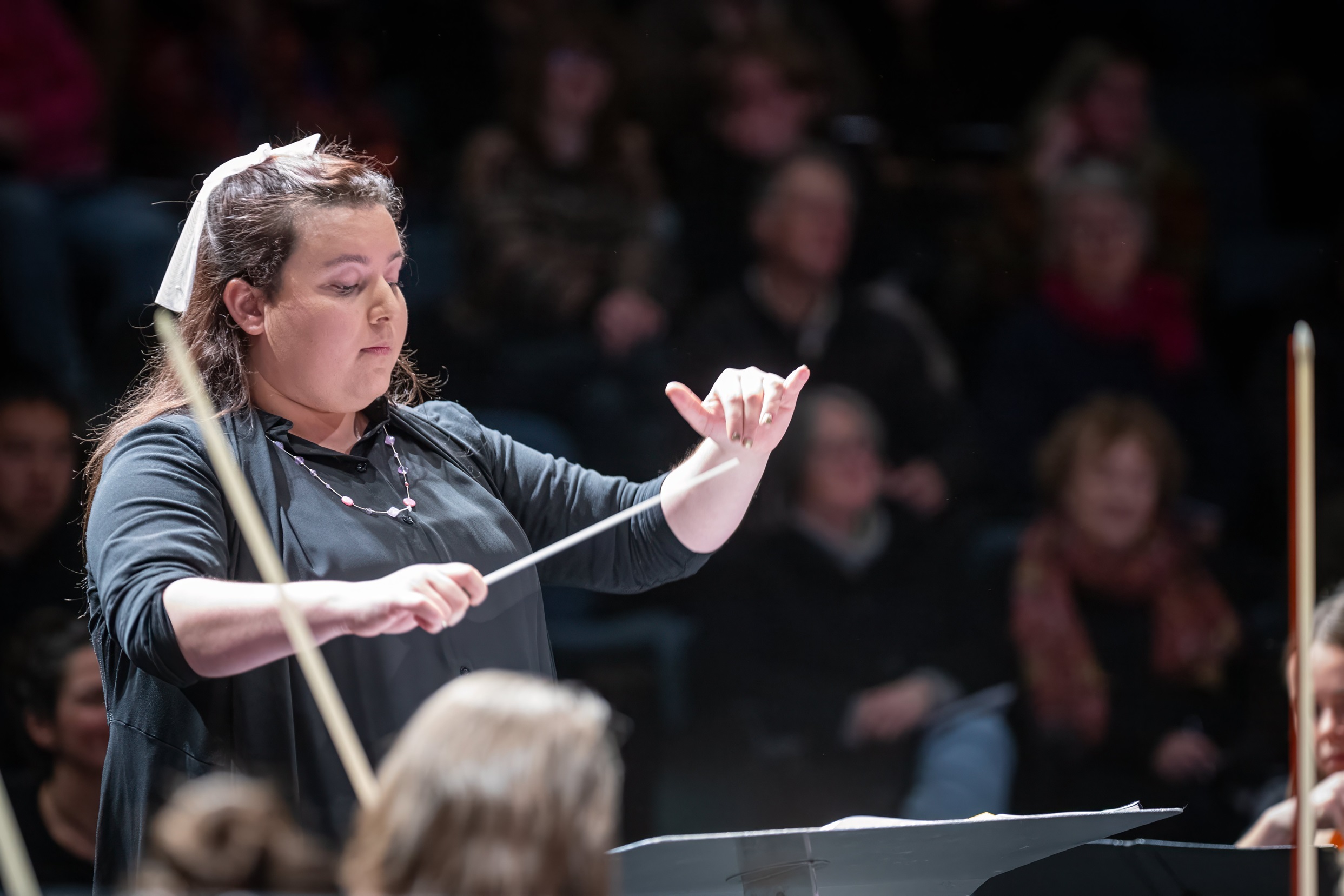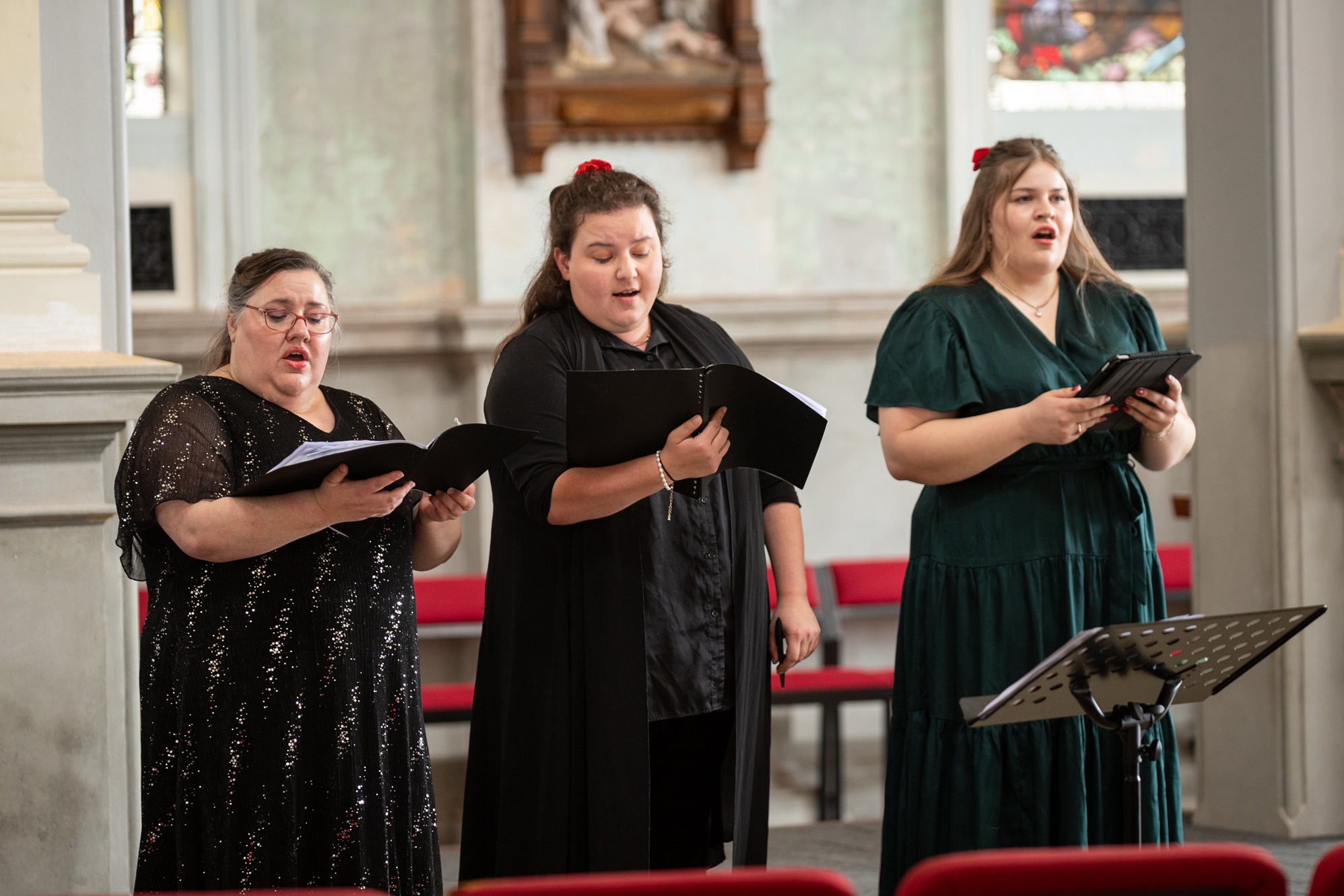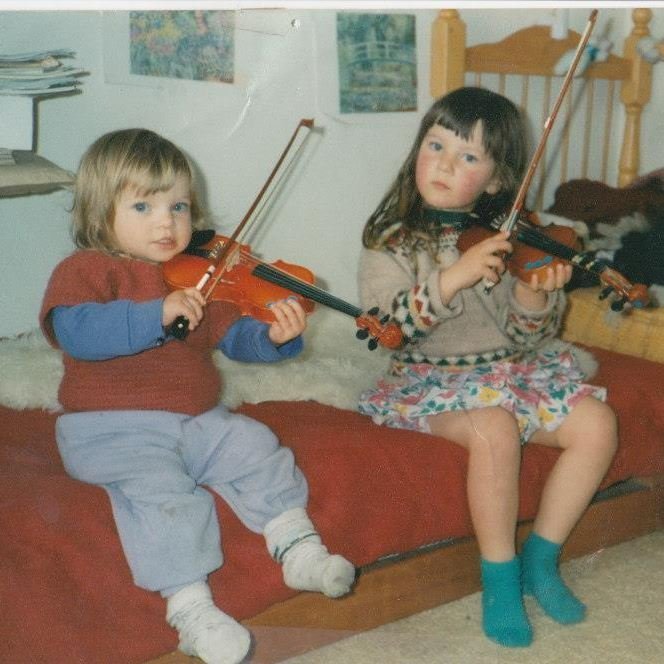
Often being a musician and teacher go hand in hand and it is certainly the case for Natasha Manowitz.
"That can often naturally happen because if you’re really passionate about something you want to be able to pass on that knowledge and share it with others," the Dunedin choral director, teacher, conductor and performer says.
Manowitz has been surrounded by music her whole life — her father Sydney is the Dunedin Symphony Orchestra (DSO) concertmaster emeritus, and mother Beverly Dwan plays violin for the orchestra — so it is not surprising to learn that she and her sister (now known as Rainbow Rosalind) had violins in their hands since they were pre-schoolers.
Having their parents play and perform around her and her sister spurred Manowitz’s passion for music.
"Especially seeing how much they enjoyed it and how passionate they were."
Manowitz then picked up the flute when she was 9 and when she hit secondary school she started performing in choirs as well as orchestras. She also did her music exams in all three.
"Violin’s a big part of the family. And violin’s such a great instrument because it is so versatile.
"When I was in high school I played in a gypsy and klezmer band as well.
"We played at folk festivals but at the same time I was also playing in orchestras like the Dunedin Youth Orchestra."
She also performed flute solo for the Brandenburg Concerto No 5 with the New Zealand Secondary Schools Orchestra in 2010 and received the Young Musicians Award in 2017, enabling her to perform a concerto movement as a flute soloist with the Dunedin Youth Orchestra.
The attraction in music is the reward of going through the process of picking up a piece, learning it, rehearsing it and then performing, she says.
"It's hard to see the bigger picture when you start. But when you get to the performance and see the reaction from the audience — and how much other people take away from that, how much they soak in the music and how much it means to them — that's really special.
"So I think that process of getting to that final stage of performance and performing is really quite amazing. Being in the moment in a performance I would say is a highlight of music."
In her late teens she wanted to share that excitement, beginning teaching privately, and that element of her musical career has just grown from there.
"I do love the teaching side of it as well. That’s definitely part of my calling I would say."
After doing a year of study in Dunedin after leaving school early, Manowitz decided to transfer to Auckland University to study flute, with a little violin on the side.
"I was exposed to some amazing teachers. And during this time I went on a tour with the Auckland Youth Orchestra to Europe [as a violinist]. It was quite incredible, a real highlight."
After graduating, Manowitz began teaching music in various Auckland primary schools and taking part in the Sistema Aotearoa programme in Ōtara, helping to provide free opportunities for children in orchestral music. She also toured around New Zealand as part of a flute-piano duo with Cindy Xia.
Six years after moving north, she decided to return home to Dunedin when a job opportunity for a flute teacher opened up. She worked as an itinerant flute teacher around Dunedin before deciding to formalise her teaching skills with a master’s of teaching and learning from the University of Otago.
"That opened up doors in terms of classroom teaching. So it’s a great qualification."
Soon after completing it in 2019 she got a job as a music teacher at her old school, Logan Park High School. She has also continued training, studying the Kodaly approach, completing all three levels of the Australian Kodaly Certificate in Music education.
Kodaly works on the concept of teaching through games and taking the child from the known to the unknown in a sequential way at a developmental level for them.

Through it all she has become more and more determined to find ways to work in the community on a bigger scale with music.
"How can we engage with young people with music in a meaningful way, particularly young children coming up from primary school ages."
One of the ways she and colleague Susan Frame decided they could do it is through a children’s choir. The pair had worked together on the Māori Hill School choir and loved it.
"We thought there is a bit of a need in the Dunedin community for something like this, something community based, open to a wide range of ages and as accessible as we can make it."
So they started the Dunedin Children’s Choir in 2023 to provide high-quality music education enabling children to sing a range of music as well as provide a range of performance opportunities.
The response from parents and their children has been "fantastic", she says. Families have supported the choir often with two or three siblings taking part.
"I think from the beginning families have recognised the importance of what we’re doing and have embraced the kaupapa and that meaning behind it."
Getting out and performing at various public events has also helped raise its profile and encourage more children along.
"I think they really love it. It's great watching their faces and seeing how much they get into the music, especially when we incorporate a lot of games and really fun songs.
"So what we try to do is really teach them so many skills. But we do it through a way where they don't realise how many skills they're actually learning."
While music may be the focus of the choir, it also provides social and academic skills.
"I would say that children sign up to the choir and everybody gets out something slightly different. As well as things that they wouldn't have expected when they came along.
"Getting into something like this can help with self-belief and confidence as well, and help to rebuild that kind of culture where singing is normal. "
It also provides a team activity alternative to sport. It allows singers to embrace their voice and work together with others.
"I think choirs are really quite unique in that way. Where it is a team and everyone's working together to create something unified.
"So often we do things individually in our lives. But how often do you get together with 20 or 30 others and all sing the same thing at exactly the same time?"
Just one year after forming, the choir received an invite to go to the World Choir Games in Auckland last year. It was a big step for the young choir but one Manowitz knew they could do.
With the help of parents, they fundraised to get the choir to the games and perform.
"For the children performing on the Auckland Town Hall stage and the way that they just absolutely filled the hall with their sound was really incredible."
They won a silver level six diploma in the children’s choir category which was quite a high-level award to get, she says.
"We were really over the moon about, especially since we are such a new choir."
This year they have split the choir into two, a junior choir for the 7 to 10-year-olds and a senior choir of 11 to 15-year-olds with about 46 members all up. She wants to encourage the older singers to continue performing and building their skills with the choir until they can move on to the New Zealand Secondary Schools Choir.
This weekend the children’s choir is performing alongside City Choir Dunedin and a jazz quintet in Alexander L’Estrange’s song cycle: Zimbe! Come Sing the Songs of Africa at Knox church.

"This music is really the kind of music that gets your feet tapping, and you want to sing along. And you see the children really embracing that as well."
Working with the choir has also enabled Manowitz to continue to develop another skill — conducting.
"It feels like I can combine all of these skills that I've worked towards in my life.
"In terms of as a musician and as a teacher and relating to different ages and different personalities as an instrumentalist and a singer.
"It's been really rewarding getting into conducting."
Having those skills means she can contribute on a larger scale in the community which she believes is important.
"Particularly for bringing up the next generation of musicians from a young age, and helping all children to realise that they are musical and innately carry a musicality and voice.
"It’s just a matter of how to use that and how to bring it out."
As well as conducting the children’s choir, she has also conducted the Dunedin Youth Orchestra for a term and has recently taken on an adult community Choir! Choir! based in Broad Bay. She has also conducted the Dunedin City Wind Orchestra.
When not working with others, Manowitz still enjoys performing herself — she played flute with the DSO for two "special" concerts in 2020: the premiere of Anthony Ritchie’s Symphony Number 5 Childhood and a Christmas concert in collaboration with City Choir Dunedin — although these days she concentrates more on singing.
Although she grew up in an instrumental household, she also took singing lessons, did exams and took part in choirs such as the Southern Youth Choir and the Auckland Youth Choir.
"It’s something that I’ve found I am really drawn to, particularly with leading choirs as well. It’s very much a part of you and your identity, and it’s coming out of yourself. Which to a point you do with instruments. But I feel that when you sing that you really are connecting with yourself on a deep level."
She also loves its ability to connect people in a meaningful way without any costly equipment required.
"What I love about singing is that you can get a group of anyone together and start singing straight away. So there can be less barriers to that.
"You can start a choir in any school without needing to purchase instruments first."
It also helps people connect to their cultures in different ways which kapa haka and waiata demonstrate.
"That is an important element in choirs as well. How can we bring that cultural appreciation and embracing a range of cultures into choral singing?"
Manowitz is also studying classical voice under Dr Tessa Romano at the University of Otago and is a member of Voices New Zealand, the national choir for adults with whom she performed Mozart’s Requiem with the DSO last year and The Planets with the New Zealand Symphony Orchestra in Wellington and Auckland. She has also sung with the Opera Otago chorus.
Through Voices she has been able to learn from choral conductor Dr Karen Grylls, not only about singing, but also conducting, something she is very appreciative of.
"That’s been amazing. She’s a really incredible person. She’s made a big impact on me."
"I really enjoy having the study alongside the teaching, and being able to grow my own skills more and more as well as share them with others."
TO SEE
Zimbe! African Folk with a Jazz Twist, July 12, 7pm, Knox Church










